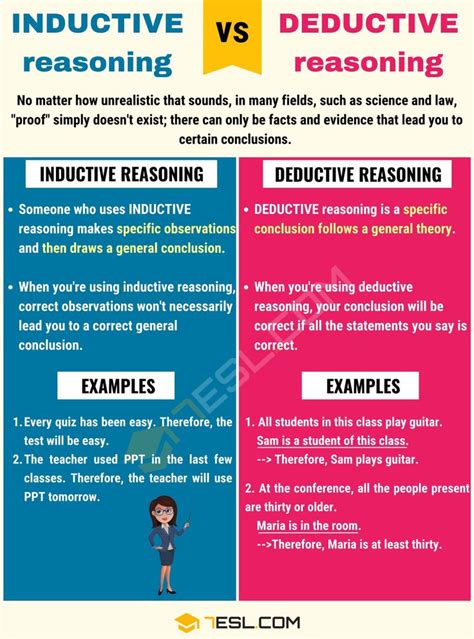Discover 7 Types Of Reasoning With Definitions And Examples In English

Reasoning is the process of making logical connections and drawing conclusions based on evidence or facts. It is an essential skill that helps us make sense of the world and make informed decisions. There are several types of reasoning that we use in our everyday lives. In this article, we will explore seven common types of reasoning, providing definitions and examples to help you understand each one.
1. Deductive Reasoning
Deductive reasoning is the process of drawing specific conclusions from general principles or premises. It involves starting with a general statement or theory and applying it to a specific situation to reach a logical conclusion. Deductive reasoning is often used in mathematics and formal logic.
Example: All mammals have lungs. A horse is a mammal. Therefore, a horse has lungs.
2. Inductive Reasoning
Inductive reasoning is the process of drawing general conclusions based on specific observations or evidence. It involves using specific examples or observations to make a broader generalization. Inductive reasoning is commonly used in scientific research and everyday problem-solving.
Example: Every cat I have seen has fur. Therefore, all cats have fur.
3. Abductive Reasoning
Abductive reasoning is the process of making an educated guess or inference based on the best available evidence. It involves considering all possible explanations and selecting the most likely one. Abductive reasoning is often used in detective work and scientific investigations.
Example: The grass is wet, and there are dark clouds in the sky. It is likely that it rained.
4. Analogical Reasoning
Analogical reasoning is the process of using analogies or similarities between two different situations to draw conclusions. It involves finding similarities between two unrelated things and inferring that they will share similar properties or behaviors. Analogical reasoning is frequently used in problem-solving and decision-making.
Example: The human brain is like a computer. Just as a computer processes information, the brain processes thoughts and memories.
5. Statistical Reasoning
Statistical reasoning is the process of drawing conclusions based on statistical data and analysis. It involves using data and probability to make informed decisions and predictions. Statistical reasoning is commonly used in fields such as economics, sociology, and medicine.
Example: Based on historical data, there is a 70% chance of rain tomorrow.
6. Causal Reasoning
Causal reasoning is the process of identifying cause-and-effect relationships between events or phenomena. It involves understanding the underlying causes of a particular outcome or behavior. Causal reasoning is often used in scientific research and critical thinking.
Example: Smoking is a causal factor for lung cancer. People who smoke are more likely to develop lung cancer.
7. Moral Reasoning
Moral reasoning is the process of making ethical judgments and decisions based on moral principles or values. It involves considering the consequences of actions and determining what is morally right or wrong. Moral reasoning is essential for ethical decision-making and moral dilemmas.
Example: Stealing is morally wrong because it violates the principle of honesty and harms others.
Conclusion
Reasoning is a fundamental aspect of human cognition and plays a crucial role in decision-making, problem-solving, and critical thinking. By understanding the different types of reasoning, we can enhance our cognitive abilities and make more informed judgments. Whether it’s deductive reasoning in mathematics, inductive reasoning in scientific research, or moral reasoning in ethics, each type of reasoning contributes to our understanding of the world.
FAQs
1. What is the importance of reasoning?
Reasoning is important because it allows us to make logical connections, draw conclusions, and make informed decisions. It helps us understand the world around us, solve problems, and evaluate arguments or claims.
2. How can I improve my reasoning skills?
Improving reasoning skills involves practicing critical thinking, analyzing information, and considering multiple perspectives. Engaging in activities such as puzzles, debates, and discussions can also help enhance reasoning abilities.
3. Can reasoning be biased?
Yes, reasoning can be biased. Biases can arise from personal beliefs, emotions, or cognitive shortcuts. It is important to be aware of biases and strive for objective and logical reasoning.
4. Are reasoning skills innate or can they be developed?
While some people may have a natural inclination towards reasoning skills, they can be developed and improved with practice. Engaging in activities that require critical thinking and logical analysis can help enhance reasoning abilities.
